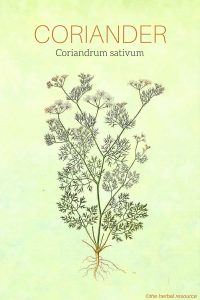Both the [easyazon_link identifier=”B001A1VIUO” locale=”US” tag=”herbal-resource-20″]seeds[/easyazon_link] and leaves (cilantro) of coriander have been used in cooking for millennia, and coriander is considered one of the oldest spices in the world, probably dating as far back as 5000 b.c. Today, it is a major component in various traditional ethnic cooking.
Traditionally, it is used to treat digestive and gastric complaints, small pox, nausea, anemia, fevers, measles, colds and hernias.
This herb is a good source of dietary fiber. The coriander leaves contain minerals like iron, magnesium, and manganese and they are also rich in vitamins A, B, and C.
Due to cineole, a phytochemical found in coriander thought to have an anti-inflammatory effect, it is been used as an herbal remedy for many symptoms associated with arthritis.
Coriander is considered a natural treatment for high cholesterol levels. There is some indication that the acids (linoleic acid, oleic acid, palmitic acid, stearic acid, and ascorbic acid) found in coriander might help to lower bad cholesterol (LDL) and raise good cholesterol (HDL).
The herb can be used as a treatment for diarrhea because of chemicals found in the essential oil. These chemicals (alpha-pinene, beta-phelandrene cineole, borneol andlimonene) have both antibacterial and antifungal properties.
The essential oil of coriander has antiseptic properties and has been used to treat mouth ulcers.
It has a reputation as an appetizer and has been used to increase appetite in those suffering from anorexia. It is thought to improve digestion and help in the secretion of enzymes and digestive juices found in the stomach.
Conjunctivitis is another ailment that’s treated by this herb due to its disinfectant and antimicrobial qualities.
Some animal studies indicate coriander can effectively stimulate the secretion of insulin and lower high blood sugar. These qualities could make it a good herbal supplement for diabetes treatment.
The vitamin K also found in the plant is thought to be help people who have osteoporosis. The vitamin K may prevent activation of cells called osteoclasts that cause bone loss.

Leave a Reply